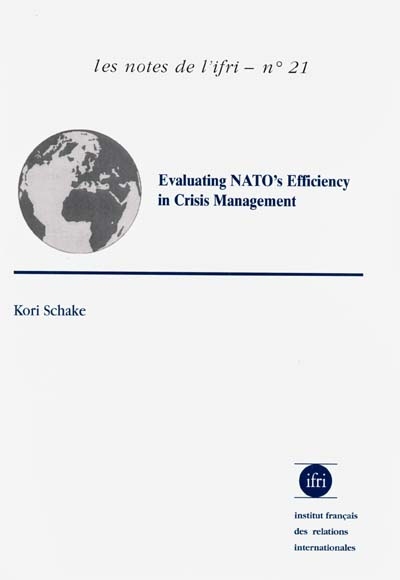en savoir plus

Permet à tous ses détenteurs d'obtenir 5% de réduction sur tous les livres lors du retrait en magasin (réduction non cumulable avec les réductions de type étudiant).
Offre également un certain nombre d'avantages auprès de nos partenaires.
Avec les favoris, retrouvez dans un espace les sélections effectuées au fur et à mesure de vos navigations dans le site.
Constituez pour votre usage personnel vos listes de livres en prévisions d'achats futurs et votre sélection d'articles, dossiers, événements, vidéos ou podcasts préférés ou à découvrir plus tard...
Il suffit simplement de cliquer sur "Ajout Favori" sur chaque page qui vous intéresse pour les retrouver ensuite dans votre espace personnel.
Requiert un compte Mollat
Requiert un compte Mollat
- Sciences humaines - Histoire
- Actualité internationale
- Relations et politiques internationales
- Actualité politique internationale
Evaluating Nato's efficiency in crisis management
Auteur : Kori Schake
en savoir plus
Résumé
L'Otan a été conçue, à l'origine, pour défendre l'intégrité territoriale et la souveraineté politique de ses Etats membres. Depuis la fin de la guerre froide, les Etats membres de l'Otan ont élargi les responsabilités de l'alliance à la gestion des crises. La Bosnie et le Kosovo ont eu valeur de test pour l'Otan, en tant qu'organisation de gestion de crises. ©Electre 2025
Quatrième de couverture
Bosnia and the Kosovo Campaign have been the first two tests of NATO's new mission of crisis management, and the Alliance made several mistakes that call into questions its suitability to manage crises. Most damagingly, NATO failed to use force effectively. Political leaders did not identify objectives or develop a strategy for using force to achieve them. Both political and military leaders failed to ensure that the means were sufficient to achieve Alliance objectives. Nato also has structural impediments to effective crisis management. However, nato has three unique advantages : it builds consensus among the major Western democratic governments ; has no peer in planning and conducting multinational military operations ; and ensures U.S. participation. These make NATO a likely participant in managing European crises, provided that NATO governments - and partculary the U.S. government - improve on the record in future crises and use military force more effectively.
Fiche Technique
Paru le : 21/09/2000
Thématique : Actualité politique internationale
Auteur(s) : Auteur : Kori Schake
Éditeur(s) :
IFRI
Collection(s) : Les notes de l'IFRI
Série(s) : Non précisé.
ISBN : Non précisé.
EAN13 : 9782865920891
Reliure : Broché
Pages : 47
Hauteur: 21.0 cm / Largeur 15.0 cm
Poids: 80 g

